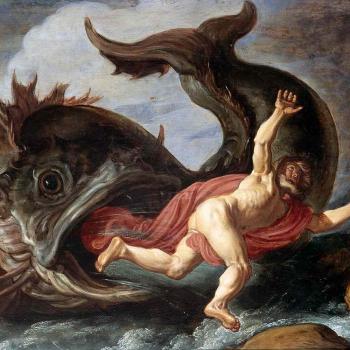Then they said to him, “What shall we do to you, that the sea may quiet down for us?” For the sea grew more and more tempestuous. He said to them, “Pick me up and hurl me into the sea; then the sea will quiet down for you, for I know it is because of me that this great tempest has come upon you.” Nevertheless, the men rowed hard to get back to dry land, but they could not, for the sea grew more and more tempestuous against them. Therefore they called out to the Lord, “O Lord, let us not perish for this man’s life, and lay not on us innocent blood, for you, O Lord, have done as it pleased you.” So they picked up Jonah and hurled him into the sea, and the sea ceased from its raging. Then the men feared the Lord exceedingly, and they offered a sacrifice to the Lord and made vows. (Jonah 1:11-16)
Jonah is on the run from God. And his running has landed both him and the crew of the ship he rented in a “boatload of trouble”. Sorry, I couldn’t help myself.
In the middle of the storm that God throws at Jonah, they cast lots to see who is at fault. Jonah is forced to admit that he is to blame, and he suggests that they throw him overboard. Despite this, the crew tries to row to shore. And, only after that effort proves hopeless, do they finally take his advice and pitch him into the water.
It’s hard to picture quite what this looked like. One ancient rabbinic source speculates that in order to avoid being held accountable for his death, the crew lowered Jonah in up to his knees and the storm subsided. So, they pulled him out. But — then the storm picked up, so, they lowered him a little deeper in the water, only to discover that the same pattern held true again. According to the rabbis, they tried this a number of times, until they finally gave up and threw Jonah in, sailing off in peace.[1]
Since the original storyteller doesn’t even offer these details, one would think that he would have said nothing more about the crew and focus exclusively on Jonah’s fortunes in the water. But he doesn’t. Instead, he goes on to note:
“Then the men feared the Lord exceedingly, and they offered a sacrifice to the Lord and made vows.”
This last sentence, as well as their distress at what Jonah has done, invites us to compare Jonah with his crew. Here are some thoughts that we can explore that are of relevance for us today:
One: When we fail to hear God, it affects others.
We often assume that listening to God is a private affair. In fact, modern American spirituality is primarily a private affair. And many people collect a pastiche of various incompatible religious ideas, superstition, self-help, and a Ouiji Board. It isn’t accountable to a faith community, let alone Scripture or the traditions of the church.
But for those of us who claim the God of Jonah and Jesus as the Lord of our lives, we know – or we should know – that our failure to listen to God has an impact on others.
Our hesitancy to own our faith, leaves those who are looking for hope without a witness to a way out. Our failure to rear our children in the Christian faith leaves them without direction, and exposes them to the random nonsense that dominates social media.
We have been particularly bad about this as a denomination and mainline Protestantism has been bad about it in general. Mother Natalie and I have daughters who are worshipping in other churches, because they can’t find an Episcopal Church that will challenge them and support them on their spiritual journeys. One is going to a pretty doctrinaire Presbyterian church, the other is going to a non-denom.
Do we think that is ideal? No. Both churches have a pretty limited view of the role of women. One offers worship that is a cross between a rock concert and a Ted Talk. But if they can’t find a church that teaches the Christian faith and lifts up the challenge of modern discipleship, alongside the sacraments that the church has celebrated for over two thousand years, then more power to them for insisting on a church that teaches and preaches the faith.
This is my wife and I – who is also a priest – are focused on the spiritual well-being of Good Shepherd and have little time for anything else. The gift that God has given the Episcopal Church is a deep connection with the teaching of the Apostles, the rich resources of the church’s liturgy, and a mission to bring those gifts to bear on the needs of the world. The future of mainline Protestantism will not be a story of denominations, it will be a story of individual churches committed to hearing the call of Christ. The churches that do this will endure. The others won’t.
But, let me be clear about this, that calling isn’t just ours as clergy, it is ours – together – as members of the body of Christ. If our choices are going to have an impact on others, let’s not do what Jonah did.
A second point Jonah’s story makes is this. We should be aware, that if we aren’t faithful, God will find a way forward and what we will be left with is the grief at having failed to respond.
The way that the story is structured is nothing short of brilliant. Jonah runs away from telling the Ninevites that they are courting judgment, because the last thing he wants to happen is for God to deliver them. And, in any event, he doesn’t believe that they are worthy of being forgiven or capable of changing.
But he finds himself in a boat with people almost exactly like the Ninevites. True, they aren’t blood-thirsty conquerors. But they don’t share Jonah’s faith. They are Gentiles, not Jews. And, yet, they demonstrate their ability to hear and – because Jonah’s God calms the waters – they even offer his God sacrifices.
Now, I don’t think that this is a story about “noble” pagans. That’s a sixties trope and it would have never occurred to an ancient Jew to make that argument. But what the description of the crew’s behavior does do, is draw Jonah’s behavior into a negative comparison with their willingness to listen. And by doing that, the story underlines Jonah’s failure:
He doesn’t think that Gentiles will listen. They do. His unwillingness to listen imperils their lives, rather than offering the healing that God is willing to give.
And, of course, that theme underlines a third one: We should never limit God’s capacity for mercy by assuming that God can’t be or won’t be more merciful than we are.
Put more positively, God’s love for us is an invitation to discover just how merciful God can be to others. And if we give ourselves to that discovery it can be – as it is meant to be – a lifelong journey.
Understandably, our tendency is to label people and make categorical judgments about who deserves God’s mercy and who doesn’t. Those categories make it easier to make sense of life.
If anything, modern life has made that tendency even more pronounced. There was a time when most of the human race lived in small communities. There were absolute limits to the number of people we knew and the ways in which our view of the world was challenged was limited. But, today, we are exposed to billions of people and an endless variety of differences. And in response, we have reintroduced tribalism in a culture that once rejected it.
Admittedly, this tendency is not utterly original with our generation. It has driven racism and ethnic tensions down through the decades. It bedevils families that have struggled to welcome the children their children fall in love with. And it has restricted the ability of churches to welcome new people.
Mother Natalie and I know an aging congregation that really struggled to welcome the growing Spanish-speaking community that became a larger and larger portion of their church. And their resistance drove real hostilities in their community the more they made themselves at home in their church. The older members of the community would have told you that they paid the bills and this excused their behavior. But that rather fragile excuse was cover for their own dis-ease with the iconography of the Latin American church. It was, in their words, so gaudy and unsophisticated, it was almost idol worshipping or Catholic.
One can talk about the cultural differences that were at work and the challenge of understanding the difference between the two communities. But, at root, the real failure was a failure to welcome the loving work of God.
It is small wonder that the early church drew comparisons between Jonah and Jesus. Jonah’s story is the prophet who won’t hear. The prophet that builds walls, where God moves beyond them. Jesus is the one who listens and whose commitment to carrying God’s mercy into the world, despite the Jonah-like resistance to his word and work.
May we give ourselves to his vulnerability and may we offer the news of his mercy to a world in need of forgiveness and reconciliation. Lord, make us messengers of your mercy.
[1] Yalkut Shimoni, l.c.













